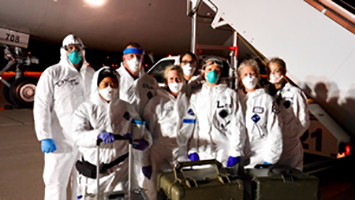Saint Leo Instructor Aids in Novel Coronavirus COVID-19 Response
Read how Saint Leo University online degree program instructor Dr. Wendy Nesheim and her team are assisting in the Coronavirus (COVID-19) response.

Read how Saint Leo University online degree program instructor Dr. Wendy Nesheim and her team are assisting in the Coronavirus (COVID-19) response.

 Saint Leo University is proud to have some members of its community who are working in the response efforts against the Novel Coronavirus, specifically called COVID-19.
Saint Leo University is proud to have some members of its community who are working in the response efforts against the Novel Coronavirus, specifically called COVID-19.
One such individual is Dr. Wendy Nesheim, an instructor in Saint Leo University's Master of Science in Emergency and Disaster Management online degree program.
Nesheim is the commander of GA-3 DMAT, a disaster medical assistance team that falls under the U.S. Department of Health and Human Services. She has 55 team members consisting of doctors, nurses, paramedics, respiratory therapists and other medical professionals. Based out of Georgia, this DMAT group is the only such one in the state but serves the entire nation.
In its Coronavirus response work, her team has primarily served evacuees who have either flown in from other countries or who have disembarked from cruise ships. The team is ensuring these individuals undergo a 14-day quarantine, and the medical personnel regularly check their temperature and other symptoms.
"Our main goal is to prevent any further spreading of the Coronavirus," says Nesheim, who is also a registered nurse. In addition to managing the DMAT group and teaching for Saint Leo, she works as a research nurse at a vaccine clinic near Atlanta.
Her medical team was initially deployed in early February. Many of the evacuees are being quarantined in hotel-style living quarters on military bases around the country. They are provided with food and other essential items during the two-week period before they are sent home.
"I must say that these evacuees have become quite friendly with our medical personnel," she says. "Rather than evacuees, our medical team members are calling them friends. When you see people supporting others in a time like this, it really shows what humanity can do."
Nesheim knows that any major emergency or disaster can bring out confusion and inaccurate information from a number of groups.
"With any disaster, you want to see a simple and single message about what needs to be done," she explains. "In the case of an emergency like this, you really need everyone to be on the same page and saying the same things to reduce misinformation."
As such, many Americans have been left wondering what to do, especially if they are feeling ill.
"In general, we've seen a lack of testing and a lack of personal protective equipment for those who are not sick," she says. "People are wondering if they don't feel well, what is their next step?"
According to Nesheim, one of the popular mottos of those who work in emergency and disaster management is, "A disaster starts at the local level and ends at the local level."
"I think that's why we've seen mayors and governors in individual states making proactive decisions," she says. "But if a local area becomes overwhelmed, the state or federal government will be asked to provide support."
 Clear Coordination is Key
Clear Coordination is KeyShe adds that everyone must work together in a strategic manner for the most effective work to be done as soon as possible.
"You have to look at all of the information very carefully. In academics, that's what we encourage – critical thinking. You have to look at all of the evidence and then use your best judgment to determine what needs to be done. There are so many agencies that have the ability to do lots of things, but they can't all just show up at once. In general, it is better to be proactive than to wait and be too late in taking action. We call this 'leaning forward.'"
Fittingly, she is currently teaching a course in the Saint Leo online master's degree program called "Policy and Politics in Critical Incident Management."
"This is an important class that takes a look at how politics can affect policy," she says. "It's obviously quite a timely topic right now with the Coronavirus. This class purposely elicits lots of opinions from students on hot-button issues, and I've added a discussion section to the class where students can talk about this Coronavirus."
While this specific course has offered a platform for discussion on COVID-19, she believes there is plenty of opportunity for further discussion in future courses within this online master's degree program.
"I think we could offer several more classes related to humanitarian issues and disasters like this pandemic. It's fascinating to study how different cultures have responded to this issue. We're also learning more about other agencies aside from FEMA that are assisting."
Plus, she's already seeing the Coronavirus show up in academic literature.
Nesheim notes that the normal flu, scientifically known as Influenza A and B, typically starts waning by April.
"But we don't know enough about this Coronavirus to determine if it will behave like the regular flu or how long this could last. It could end up being like the swine flu from a few years ago or even the Spanish flu from 1918. We just aren't sure."
Over the past few weeks, she has read about nearly 70 different drugs and drug combinations that have been proposed as potential treatments for COVID-19. She warns that research is still in the very early stages and that it's challenging to know what might work as a potential treatment.
"Even if we use existing medications to minimize or get rid of the virus, the whole process takes time. You have to find enough volunteers to participate in the trials. You have to look at how safe the drugs are and then determine the proper dosage. Once you have all this down and have a large enough population involved, then you might finally start seeing some positive results."
Much like a traditional flu shot, there are efforts to develop a vaccine to prevent the virus from infecting individuals. Once again, time is not on the side of the researchers.
"Vaccines take a long time to develop. Once you develop one, you have to look at how effective it will be and potential side effects. You also have to look at the worst strains of this virus and the mutations. If we can develop one vaccine, ideally it would be able to treat all strains."
She adds that the Coronavirus is a family of viruses that has existed for many years. However, COVID-19 is simply a new virus under this umbrella.
In the end, Nesheim believes having gone through this experience will teach those in our country – and people globally – how to better handle pandemics like the Coronavirus and other natural disasters like hurricanes, tornadoes and earthquakes.
"In the U.S., we haven't seen a lot of humanitarian disasters. We haven't seen something quite like this at this level in modern times. It's a whole new experience for emergency managers and government leaders to learn from."
Photo credit: The photographs included in this blog article are courtesy of the Assistant Secretary of Preparedness and Response (ASPR).
#SaintLeo